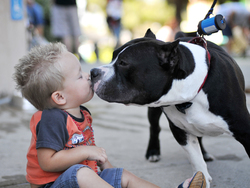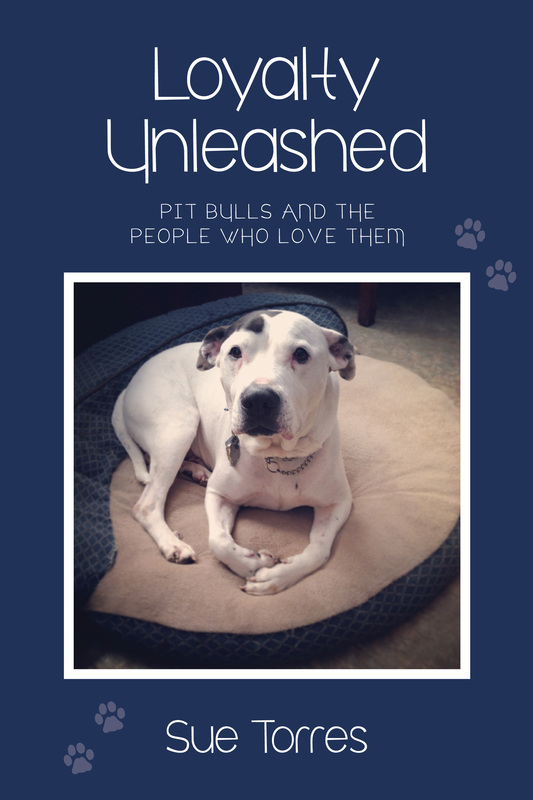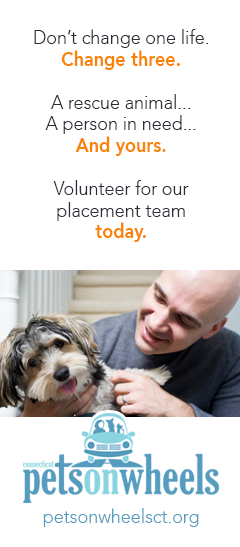
In the course of seeking information about pit bulls that I could share - stories of interest, training tips, legislation updates, resources, you name it, I was able to find everything I was looking for in one place – The StubbyDog Project website.
While I have visited the site countless times, it only recently occurred to me to reach out to this organization and introduce myself. My email was promptly returned by Executive Director, Mitzi Bolanos who was kind enough to give me a little bit of an inside look into the organization and also encourage me to write an article about my book for the StubbyDog website.
Today, I would like to share more about the stellar work this organization does to promote a positive image of pit bulls and to educate the public on so many relevant topics with regard to pit bull adoption and ownership.
The following is a Q&A with Mitzi Bolanos, Executive Director of StubbyDog..
A. I wasn’t around when StubbyDog first began in 2011, but I know it began with many talented and dedicated volunteers. In the summer of 2013, there was a change in leadership and that’s when the current board, including myself, took office. StubbyDog began as a transmedia organization focused on changing public perceptions of pit bulls and dismantling the associated stereotypical thinking by celebrating these dogs as heroes, therapy dogs, athletes, and just your everyday loving family companions. Today, we serve as a resource for advocates working against breed discriminatory policies. We have a breed discrimination packet that you can download from our website, as well as resources for renters. In addition, we promote spay/neuter and force-free training, as we believe that both of these are key factors in reducing the number of pit bulls we find in shelters across the country. From the beginning, and with the help of our volunteers, we’ve tried to change the conversation from offering defensive explanations (e.g. “blame the deed, not the breed”) to engaging people with lovable characters and letting those stereotypes melt away as a result. We keep the conversation positive and you’ll see that theme throughout all of our posts.
Q. You grew up in a part of the country where there is a breed ban. Obviously, there is still much work to do to change perceptions and open people's minds. Do you feel that overall things are improving across the country? How and why?
A. The situation is absolutely improving. We have nearly 20 states that have made it illegal for their cities or towns to pass any breed discriminatory laws. While some of those states may have cities that were either grandfathered in (Florida) or follow home rule jurisdiction (Colorado), these laws are still a huge step forward. The conversation is also changing. More and more people are adopting these dogs and falling in love with them – those people become advocates without even knowing it. While the Michael Vick case was horrific, it did shed light on the resilience of these dogs – several of whom are now therapy dogs. After that case, I think these dogs are more likely to be seen as victims and more people want to help.
Q. Who are the people who make up StubbyDog and what are their roles? Are you all volunteers or are some of you paid?
A. StubbyDog has a 3 member Board (Russ Mead, Laura Allen, and me). We are all volunteers and we have no staff. Each of our Board members is an animal attorney and each has worked against breed discriminatory legislation for many years. More about each of us here.

A. Our current project is a partnership with Anchorage Animal Care and Control and Alaska Dog Sports where we sponsor a 6 week training class for all adopted pit bulls. The goal is to build long-lasting bonds between adopters and their dogs to help keep these families together. These well-behaved dogs then speak for themselves and help promote their own positive image in our communities. We hope to be able to partner with other shelters and nonprofits in the future and extend this program to other cities.
We love to share photos of happy pit bull families on our social media sites, as well as photos of pit bulls really making a difference in their communities: therapy dogs, police dogs, search and rescue dogs, etc.
We also like to highlight the great works of other animal welfare organizations, and especially help get their adoptable dogs some extra exposure. I think the network of organizations and partners that we’ve created is an integral part of our work and the more we collaborate the more good we can do.

A. If the person is a pit bull parent, the first thing we say is that if they walk their dog regularly or otherwise spend time with their dog in public, then they’re already doing a huge service to the StubbyDog community, just by showing everyone that pit bulls are ordinary, loving family dogs. I think this is the biggest impact we can make.
Another great way to help is to print out our spay/neuter flyers (“Spayed & Fabulous” / “Neutered & Proud” found here) and share them in your community. We are also available to help with funding for spay/neuter surgeries for those who cannot afford the procedure.
Groups and individuals can also hold fundraisers to benefit our sponsored training programs to help keep families together. These types of funds will also help the program expand so we can soon partner with other shelters.
Q. What are some of the things you want people to know (about pit bulls, about StubbyDog or anything else)?
A.The main idea we always try to convey is that pit bulls are just dogs, and they deserve a loving home just like any other dog. We want dogs to be seen as individuals and not to be judged by the shape of their heads, or by the crimes of their humans.

I encourage everyone to support The StubbyDog Project in any way you can and to share the organization’s website with everyone you know. There is so much we can all learn and here you will find a wealth of information that is essential to any pit bull parent or anyone who is considering adding one of these wonderful dogs to your family..




 RSS Feed
RSS Feed